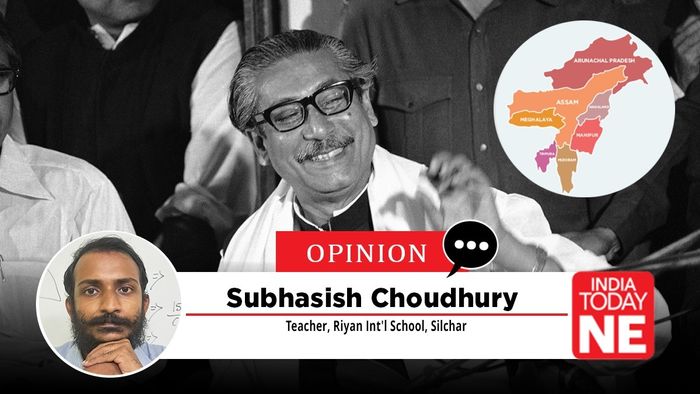From champion of Pakistan to architect of Bangladesh: Ideological journey of Sheikh Mujibur Rahman
- Sheikh Mujibur Rahman initially supported the idea of Pakistan to secure a future for Muslims in India. - He later played a pivotal role in the formation of Bangladesh as a secular state. - Mujib's early political activities included efforts to include Assam into East Pakistan.

- Aug 12, 2025,
- Updated Aug 12, 2025, 5:28 PM IST
Without any debate, Bangabandhu Sheikh Mujibur Rahman was a staunch supporter of the idea of Pakistan in his early political life. He wrote in his autobiography, “Without it (Pakistan), Muslims had no future in our part of the world.” He was a follower of Suhrawardy Khan, infamously known as the Butcher of Bengal, who is often alleged to have facilitated the Calcutta Killings and later the Noakhali Massacre.
Sheikh Mujib was one of the frontline organisers of meetings and rallies across Sylhet for the Muslim League, with the objective of securing its inclusion in Pakistan. In his autobiography The Unfinished Memoir (translated version), he notes, “When we went to Sylhet and plunged headlong into the referendum campaign, Mr. Suhrawardy accompanied us. I met him at a huge public meeting in Karimganj. I had given a speech on the occasion.”
He further mentions, “In the east, even though the referendum had been won in favour of Pakistan, the Muslim-majority subdivision of Karimganj went to India. We had believed that they would also have to cede Cachar district in Assam as well as Sylhet, but this was not to be. I was especially saddened by the loss of Karimganj since I had spent a lot of time there during the referendum.”
According to Sheikh Mujib, Zakiganj, which was once part of the Karimganj subdivision of Sylhet, was set to be acceded to India along with the rest of Karimganj in exchange for Moulvibazar in Sylhet. However, he managed to prevent this. Zakiganj now lies on the other side of the border of Karimganj (now Sreebhumi).
One of Sheikh Mujib’s statements, particularly significant in the context of the North East, was: “Because East Pakistan must have sufficient land for its expansion and because Assam has abundant forests and mineral resources, coal, petroleum, etc., Eastern Pakistan must include Assam to be financially and economically strong.” It is important to note that, at the time, the map of Assam included the modern states of Nagaland, Meghalaya, and Mizoram within its boundaries.
The plan to include the whole of Assam into East Pakistan (or turn it into a Muslim-majority province) was initiated as early as the 1930s, when the Prime Minister of Assam, Saadulah, promoted the migration of Muslims from East Bengal to Assam and facilitated their settlement. This demographic shift benefited the Muslim League to the extent that Jinnah almost convinced the British that Assam was a Muslim-majority province and therefore should be included in East Pakistan.
In the later part of his life, Sheikh Mujibur Rahman’s ideology seemed to shift dramatically. The first indication of this may have been the decision to rename the Awami Muslim League as the Awami League to include Bangladesh’s minorities in political processes. Sheikh Mujibur Rahman, as famous known for, later lead the struggle against Pakistani persecution and the policy of politically alienating the Bengali community, which ultimately led to the liberation of Bangladesh.
Under his watch, Bangladesh was officially constituted as a secular nation, ensuring constitutional safeguards for minorities, especially Hindus. However, attacks against minorities have continued and remain frequent in Bangladesh, targeting not only Bengali Hindus but also Manipuris, Kukis, Chakmas, and tea garden workers who were left on the other side of the border due to the partition plan over which they had no control. Even today, many communities remain divided on both sides of the Indo-Bangladesh border, fostering complex identity politics based on religion and language in India, as well as in Bangladesh.